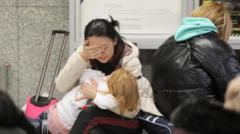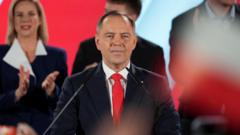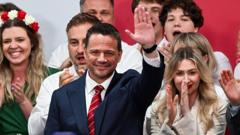Ukrainians living in Poland report a significant increase in anti-Ukrainian sentiment, citing instances of bullying and ostracism, particularly as the country's political landscape shifts ahead of upcoming elections.
Rising Anti-Ukrainian Sentiment in Poland Sparks Concern Among Refugees

Rising Anti-Ukrainian Sentiment in Poland Sparks Concern Among Refugees
As Ukraine's war refugees face mounting hostility in Poland, reports of discrimination and abuse raise alarm amidst a polarizing political climate.
Svitlana, a 31-year-old Ukrainian mother, recalls how her daughter once thrived at school in Poland, expressing a strong attachment to her classmates and teachers. Unfortunately, the situation took a turn for the worse when her daughter experienced bullying due to her ethnicity, exemplified by a classmate's remark, "Go back to Ukraine." This incident is not isolated, as many Ukrainian refugees in Poland are facing similar challenges amidst a backdrop of rising nationalism and xenophobia.
Reports of abuse have grown alarming, with Ukrainians sharing their distressing experiences of discrimination on public transport and in schools. The recently intensified anti-Ukrainian sentiment appears to coincide with Poland’s upcoming presidential elections, where candidates are increasingly leveraging the refugee situation to appeal to voters.
Svitlana’s daughter, already traumatized by the war back home—where missile strikes have claimed lives—was further disturbed by classmates mocking her language. Svitlana, who chose to remain anonymous for fear of repercussions, noted that hostility towards Ukrainians is visibly escalating, not only in schools but also in workplaces. She expressed concern that many Ukrainians feel unwelcome and are considering returning home.
Administrative data indicates that approximately 2.5 million Ukrainians reside in Poland, constituting about 7% of the nation’s population. When the full-scale invasion of Ukraine commenced in February 2022, there was a notable wave of compassion and support from the Polish populace. Currently, however, that goodwill may be waning, as reflected in recent poll data that indicate a drop in support for Ukrainian refugees.
Activist Natalia Panchenko, leader of the 'Stand with Ukraine' Foundation, expressed that while many Poles continue to support Ukrainians, there is an undeniable surge in anti-Ukrainian rhetoric both online and in public settings. She highlighted that the psychological impact of the war—a factor for many Ukrainian refugees—renders them particularly vulnerable to prejudice.
The growing political rift regarding Ukraine is complicated by far-right candidates in the presidential race who rally against what they term as ‘Ukrainisation,’ promoting narratives suggesting that Ukrainians are misappropriating Polish resources. Political analysts note that leading candidate Rafal Trzaskowski is downplaying his formerly explicit pro-Ukrainian stance to appeal to a shifting electorate.
Amidst the political upheaval, the Polish government warned of foreign interference aimed at exacerbating these sentiments during the electoral cycle. Humanitarian organizations remain on alert as disinformation regarding Ukrainians circulates widely, contributing to the hostility experienced by refugees within Poland.
In conclusion, the escalating anti-Ukrainian sentiment marks a troubling shift for many who sought refuge in Poland amid conflict, casting a shadow on the nation's traditionally warm reception and raising pressing questions about future support for displaced individuals.





















